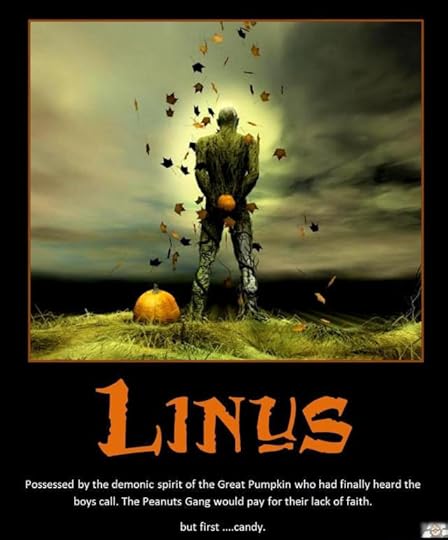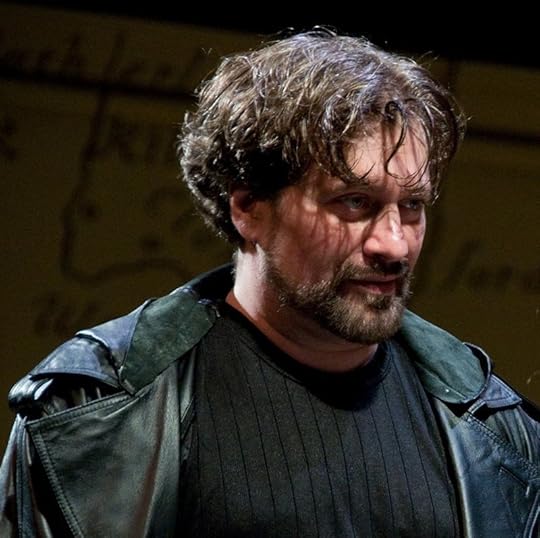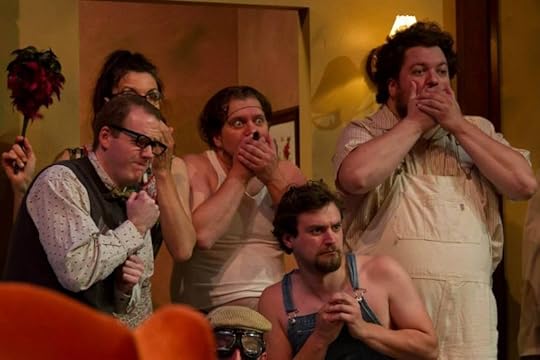David Blixt's Blog, page 10
October 30, 2013
Heirlooms - A Short Story
 After
After
Henry’s grandfather died and the will was read, Henry was upset to learn that
all that had been bequeathed to him were the dead man’s shoes. Not just any of
his shoes – the very ones he had died in.
“I
knew granddad never liked me,” groused Henry to his cousin, who had fared much
better – she had gotten an automobile.
“Nonsense,”
his cousin had said. “I think it’s rather touching.”
“Wanna
swap bequests?” Henry asked.
His
cousin said no. “It’s not like they would fit.”
It
was true. They were so large, they wouldn’t fit anyone but Henry. Still, they
made Henry quite angry. When he got home he took the old patent-leather
wingtips and threw them in a corner of his closest and forgot about them.
Sometime
later Henry was invited to a fancy dress party. He rented a tuxedo complete
with cummerbund, clip-tie, and fancy shirt. He even rented shoes. But when he
tried them on, they bit so horribly into his ankles that he could barely walk.
Mincing around his apartment in agony, he finally kicked them off and went
hunting in his own closet for something decent to replace them. Naturally he
found his grandfather’s shoes. After a little polishing he decided that they
would suit him fine.
Slipping
them on, he found they were very comfortable. He went to the party and danced
the night away. He felt very light on his feet, and never grew tired.
He
began wearing the shoes everywhere. Naturally he felt silly wearing nice
leather shoes with his jeans and t-shirts, so he began to invest in better
clothes. His friends remarked upon his change of attire, lightly ribbing him,
but he didn’t mind. He felt good in his clothes. Looking at his friends, they
seemed slovenly, unkempt, even ludicrous. If the clothes make the man, he
thought, then I am a better man than all my friends.
And
their music! Things he had listened to with them, even the music he’d grown up
with, all now seemed piercing and shrill and undignified. He started listening
to music that had more swing, more rhythm, more soul. It’s a shame they didn’t
make music like that anymore, Henry thought.
He
started spending more time alone. He preferred the comfort of his own armchair
to the loud and busy bars and restaurants he used to frequent. He stopped
exercising. He found himself yelling at the television. He had a cutting remark
for everyone at work.
Then
Henry died. Alone. Unhappy. Nearly forgotten.
It’s
said to know a man, you have to walk a mile in his shoes. But that advice
should bear this warning: before you slip the shoes on, make sure you like
where the previous owner ended up.
October 29, 2013
Sincerity - A Halloween Short Story
“So. You finally show
up.”
It was a tick past the
witching hour, and the thing had risen from the field, blinking and staring
about in confusion. In its powerful, vibrating basso it said, “Where?”
“This is my field.”
The thing bent down,
squinting through its giant hollow eyes, peering at the man with the rat’s nest
hair. “Oh. You.”
“Me,” said the man,
voice shaking with horror and fear and exultation. “Me. A thousand times, me!”
“You should not haunt me
so.”
“Haunt you? Haunt you?!”
The slight hysteria in his laugh was mirrored in his eyes. “My family thinks
I’m mad. My church has cast me out. My political career, destroyed. And for
what? For you! For this moment. Years spent cultivating acres upon acres of
your pathetic fruit. It is a fruit, you know. The seeds are on the inside.”
“I never claimed
otherwise.”
“No.” The man clutched a
holey rag closer to his chest. Once, it had been a pristine blue. Now it showed
more of the black night through its many gaping tears. Yet it was obviously
precious. “That was my mother. Eat it, she’d say. It’s a vegetable.”
“You blame me.”
“For that? No. For
everything else – why did you wait so long?!”
“I never felt that you
were sincere.”
“And now you’re
satisfied?”
“I am here,” was the
creature’s only reply.
There was a prolonged
silence as the man struggled with his feelings, and the creature examined the
night.
“Well,” said the man at
last, “do I at least get my share?”
“Your share?”
“Of the toys.”
“Ah. The toys. They are
for children.”
The man shook his fists,
waving the tattered cloth in his hand like a flag. “No! Unfair! I’ve waited too
long for you to deny me now!”
“It is too late.
Besides, you would not want these toys.”
The creature gestured,
and the man noticed sacks of bulky objects that lay scattered all through the
viney field. Opening the nearest, he saw devilish toys with sticky handles and
sharpened ends.
“You give these to
children?”
“Sincere children do not
see them for what they are.”
“I am sincere!”
“Even so, you are too
old.”
“But I still have the
heart of a child!”
“Truly?” said the
creature, wild whippy limbs sliding it inevitably forward. “Let me see it,
then.”
* * *
Dawn, a red autumnal
light against the darkness. In the small house beside the vast field, a woman
stirred. Rising, she checked the clock, then peeked into her brother’s room.
The bed was empty. She grunted derisively.
Stomping down the
stairs, she decided to make herself some coffee before she went out into the
fields to retrieve him. But the coffee can was empty. She threw it across the
room, and with a lip curled in disgust she made herself some of her brother’s
herbal tea.
Since her divorce from
the musician – she refused to even say his name! – she had been reduced to
living here. The judge had not only stripped her of every conceivable asset, he
had also questioned her right to practice! ‘Emotional cruelty’ indeed! And the
blockheads on the state board had agreed, suspending her license. Oh, when her
lawyer got through with them…
There was a creak and
the backdoor opened. “Finally found your own way back?”
But it was not her
brother. “It’s me,” said the bald man.
“Oh. I was just thinking
of your sister. Has she talked about my case?”
“No.” The bald man
shrugged. “We don’t talk much.”
“Oh.” She tried to make
small-talk, a thing she hated. “How did the team do? I didn’t watch.”
He shrugged. “It’s a
rebuilding year.”
“Of course it is,” she
snorted.
The bald man looked
around the kitchen. “He’s out there?”
“Where else would he
be?”
“I usually go get him.”
“Well, I’m here this
year,” she said haughtily, pulling a coat on over her robe. “I’ll do it. He’s
my responsibility.”
“I’ll go with you,” said
the bald man.
“Whatever.” She opened
the back door and lead the way out into the field.
Thus they were together
when they found him. He was lying still, and at first they thought he was
sleeping. But the frost on his cheek had not melted.
She was stricken, and
kicked his lifeless body several times, screaming at him for his stupidity. The
bald man looked like he wanted to stop her, but waited until she was through
before he went and looked his old friend over. “There’s not a mark on him.”
“What, did you think he
was bit by a snake? You blockhead.” She suddenly sagged. “It’s never been the
same since that stupid dog died.”
“I know,” said the bald
man.
“They ever find out who
shot him?”
“You know they didn’t.”
The bald man pried the tattered old blanket out of his friend’s hand and,
fittingly, laid it over him.
As it unfurled, three
trapped white teardrops fell to the ground, all unnoticed. For it was no great
thing to miss three little seeds in this grand pumpkin patch. Standing in its
center, one had to admit there was nothing but sincerity as far as the eye
could see.
October 28, 2013
A Muse - A Short Story
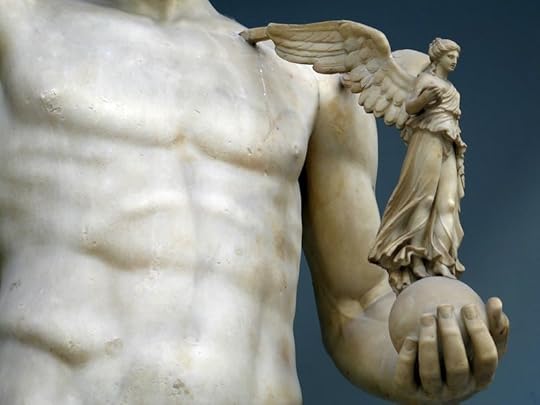
The door closed, and Father Giacomo
placed the long stone in a small, felt-lined case before shuffling back up the
hallway. His feet ached already, and the day had barely begun. But at
ninety-three years old, he felt he was lucky to feel his legs, much less
balance on them.
He attributed his continued
mobility to the 76 push-ups he did each morning. He had once heard that the
American actor Don Ameche did 75 push-ups each morning, and Father Giacomo knew
a man of God should be able to outperform an actor. Hence, 76.
His nights were broken affairs,
with frequent trips to the bathroom for a bladder that no longer held as much
water as once it had. I need the Venetian
government to come and inflate a support below my belt, he mused.
He was always a-musing, and often
amused. Having worked in the Vatican for fifty years, holding the same
thankless, ridiculous, yet priceless job, he could not have survived without a
sense of the absurd. Other men scoffed at him.
He’d had assistants once. But when
those men rose to become bishops and cardinals, while he remained doggedly in
place, he had declined to have any more. He couldn’t stand being pitied, or
mocked, or looked down upon. In his small way, he was restoring sanity and
beauty to the world. A task he had undertaken over fifty years before. And if
he died before his work was done, well, that was God’s will.
Here was the first one. Opening his
small felt-lined case, he lifted the stone up and saw at once that it was not a
match. A different colour stone altogether, alabaster, not dusty grey. Yet he
still tried, knowing that the stone had been locked in that chamber for nigh-on
five hundred years, without light or polish, covered in the dust of ages. He
turned it this way and that, from every conceivable angle before concluding
that, no, it would not fit.
Already there was a giggle from
down the hall. Tourists. They always laughed when they saw Father Giacomo. He
normally tried to visit each gallery when it was closed to the public. But this
hall was always open, and it was best to get through it before the flood of
visitors engulfed it.
Tucking the stone away in the
felt-lined case, he moved on to the next one. He had long ago memorized the
location of each monument, and there was something comforting about his routine.
Each morning he would take a stone from the room and set out, like a pilgrim,
to make his circuit, not just of this museum, but of the whole of Vatican city.
Museum,
he mused as the morning wore on. A
fascinating word. A repository of Muses, a place for them to gather. Muses
inspired art, they said. Euterpe for Music. Erato for Love poetry. Urania for
Astronomy.
Once more tucking the stone away
and shuffling to his next station, Giacomo wondered which muse guided his life.
At once he gave himself a mental yellow card, for his life was guided by Christ
and his Apostles, not the pagan muses. But the question interested him, so he
reframed it. Were his life guided by
a muse, which muse would it be?
His fellow priests would all
clearly say Thalia, the muse of Comedy. And on most days Giacomo might be seen
to agree. He was an agreeable man.
But he was also devout, and
devoted. He had undertaken this monumental chore in 1962, never suspecting it
would become his life’s work. Risible, mockable, yet dogged and indefatigable.
Perhaps his muse was Melpomene, the muse of Tragedy. Fifty years, for one
unfinished chore. One that could have been finished years ago, had the Vatican
cared enough to actually devote some resources to this.
But
then, thought Giacomo wryly, what
would I have done with my life?
At noon he carefully lowered
himself onto a bench out in the yard. Setting the felt-lined case between his
feet, he opened the satchel that hung at his belt. Besides the tools of his
trade, he also had a bag of apple slices, and a small juice-box, the kind
children are given with their meals. As
men begin, so they end, he mused.
Will I die a child? Just please, no diapers.
He also had a small container of
peanut butter. He spent the hour quietly chewing, careful of his dentures,
watching the people go by him.
I
see more art in a day than men see in their lives. I see more people in a day
than live in most towns. I may not be the most respected man within these
walls. But it is possible that I am the most blessed.
His afternoon carried on as his
morning had, until he reached the second floor of the east wing. Opening his
small felt-lined case, he experienced one of those rare moments where his heart
began to race. The colour was a perfect match. Careful not to let the stone
slip from his shaking hands, he raised the stone into the gap just above his
head. It only took a moment before he had it fitted perfectly. There was almost
no seam, even.
Lowering the long stone in his
hand, he looked about him with proud satisfaction. He was quite alone, save for
the other statues. But he imagined they approved of his task, his care, his
skill.
Skill.
Yes, no time for crowing, peacock. Placing the stone back in the felt, but
not closing the case, Father Giacomo opened the satchel at his belt and began
to work. He dusted, he examined, he dusted again. Then he opened the apoxy,
carefully filling the vacant end with a coat that was neither too thick nor too
light. Too light and it would fall off. Too heavy, and there were be a sign.
Raising the stone again, he
carefully, lovingly, set it in place, restoring what had once been piously
lost. He still held his brush in his left hand, and now swooped it around the
seam, adding a layer of glue to the outside. Invisible, yet firm. Like the hand
of God.
Now came the awkward part –
standing here and holding the broken stone in place. How often had he been
doing just this when the doors opened and tourists entered, only to laugh at
him. Many women were scandalized. There had been complaints, even. But his was
a spiritual task – restoring what once was lost. Making the world whole.
After ten minutes he gently
released his fingers and stepped away. Looking at the whole, it was like seeing
something new. Like Venus stepping out of the sea foam that had birthed her.
Though this was as far from Venus as was possible. This was Adonis – or could
have been. His right arm was still missing, and his left hand. His hip was
cocked to one side and his head canted down and to the right. But, in Father
Giacomo’s mind, he was whole.
Though his feet ached terribly,
Giacomo did a little dance. In that moment, he knew which muse guided him. Not
Thalia, not Melpomene, but Calliope – the muse of Epic poetry. For he had
laboured longer than Odysseus, harder than Hercules. His was an epic task, and
today he had conquered, traveled one more step towards victory.
He could have gone home then. A
success was all too rare. Another man might have proclaimed his work complete
and gone back to savour his triumph. But Giacomo knew that God favoured work
and rewarded dedication. Tucking away his brushes, glue, and picking up his
now-empty case, he hobbled back across the whole of the Vatican to where he had
started. Opening the door, he turned the knob for light.
There before him, in a pile that
reached for the ceiling, were countless stone penises. Father Giacomo selected
one at random, a bulbous one with spidery veins of grey through the chalky
marble. Dusting it off, he placed it in his felt-lined case. Then,
extinguishing the light, he shut the door and shuffled off once more to make
the rounds of ancient stone men longing to be whole once more.
October 27, 2013
Lurks - A Very Short Story
The radio had it wrong.
He didn’t have a name. He had a title.
He didn’t have a friend. Or if he did, he
didn’t keep her long.
But he was the master of minds. They got
that right.
He’s not invisible. He’s in plain view.
He’s what’s left when you turn out the
light.
He knows evil.
He knows you.
How he laughs.
October 22, 2013
The Prince's Doom, the film trailer, and a Kickstarter campaign!
It seems that if you save all your news to release at once, you're guaranteed to get a fantastic post.
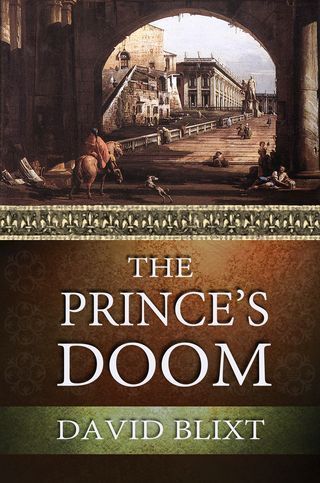
First, The Prince's Doom has a release date! March 4th, 2014. Mark your calendars - or pre-order it by clicking HERE!
Secondly, last spring I partnered with the Italian film-maker Anna Lerario, who had just finished filming a documentary about Cangrande. She asked permission to use my title and link her film to my novel. After seeing the film, I said an enthusiastic yes. I even penned the copy for the English translation of the film, now entitled Cangrande della Scala - The Master Of Verona. The film screened this month at the Venice Film Festival, and is generating a huge amount of buzz - so much so that Anna and I are releasing a book/DVD special edition of The Master Of Verona early next year, to be sold exclusively in Italy.
As a "thank you" to me, Anna took her footage and crafted a fantastic book trailer for the Star-Cross'd series. I'm truly overwhelmed. It's just lovely - feel free to watch it.
But to watch it, you have to check out Sordelet Ink's new Kickstarter campaign! We're starting production of the Star-Cross'd audiobooks next month, and we need some help with the production costs. For all the glamour of our stories, we're still just a scrppy two-man company trying to bring those stories to you. It's a very small campaign - just $5,000. And there are plenty of treats in store for people who donate - including advance copies of The Prince's Doom and one of those special edition DVD-book combos of The Master Of Verona I mentioned earlier! (See how it all comes together?)
So click on the link below, watch the Star-Cross'd book trailer, and then consider tossing a few dollars into the kitty so that we can give these books a voice!
October 8, 2013
Four Emperors Tour!
Thanks to the astonishing and marvelous Amy Philips Bruno at Historical Fiction Virtual Book Tours, I'm touring the interwebs promoting the second book in the Colossus series, The Four Emperors, now out in paperback! Reviews, interviews, guest posts, book giveaways - loads of excitement! Now through October 25. (For the official page, click here.)
Rome under Nero is a dangerous place. His cruel artistic whims border on madness, and any man who dares rise too high has his wings clipped, with fatal results.
For one family, Nero means either promotion or destruction. While his uncle Vespasian goes off to put down a rebellion in Judea, Titus Flavius Sabinus struggles to walk the perilous line between success and notoriety as he climbs Rome’s ladder. When Nero is impaled on his own artistry, the whole world is thrown into chaos and Sabinus must navigate shifting allegiances and murderous alliances as his family tries to survive the year of the Four Emperors.
VIRTUAL BOOK TOUR SCHEDULE
Monday, October 7
Review at Confessions of an Avid Reader
Tuesday, October 8
Review at Reading the Ages
Interview at Confessions of an Avid Reader
Wednesday, October 9
Guest Post at Historical Tapestry
Thursday, October 10
Review at Historical Tapestry & The Adventures of an Intrepid Reader
Friday, October 11
Review & Interview at Oh, For the Hook of a Book!
Guest Post at Bibliophilic Book Blog
Monday, October 14
Review at Just One More Chapter
Tuesday, October 15
Review at WTF Are You Reading?
Wednesday, October 16
Review at A Bookish Affair
Review & Giveaway at Closed the Cover
Thursday, October 17
Guest Post & Giveaway at A Bookish Affair
Friday, October 18
Review at The Musings of a Book Junkie
Monday, October 21
Review & Giveaway at The True Book Addict
Tuesday, October 22
Review & Giveaway at Broken Teepee
Wednesday, October 23
Review at Dee’s Reads
Guest Post & Giveaway at HF Connection
Thursday, October 24
Review at She Reads Novels
Friday, October 25
Review at A Book Geek
Review & Giveaway at The Most Happy Reader
August 15, 2013
Wonders of Rome Blog-Hop and Giveaway!

I’m honored to be a part of this weekend’s blog hop, entitled The Wonders Of Rome.
For those who don't know, a blog hop is where a bunch of writers all choose a theme and share links with their readers to the others' blogs. In this case, writers of Roman fiction have united for the weekend to share thoughts and inspirations about ancient Rome. Please click the links at the bottom to join in the festivities and see the cogitations and fancies of people as in love with ancient Rome as I am.
But first, my contribution. I've spent a long time pondering what to write. Should I focus on the Latin language? On some strange quirk of circumstance or history? On a single person? Should I try and plug my own Roman novels along with everyone else’s? (I do have one coming out next month.)
I've decided to put off plugging the book for a couple days (though I'll say here and now that I'm giving away a print copy of THE FOUR EMPERORS to whoever leaves the most interesting comment(s) this weekend).
But in considering the theme "the Wonders of Rome", I'm thinking I should explain why I so love Roman history. Yes, I'm attracted to the life of Julius Caesar above all others. I adore good retellings of Marius and Sulla and Gracchus and the rest. But to me, there is a single moment in time that fascinates me, and always will.
You see, among all the astonishing achievements of the Roman Empire, the one that most amazes me is the fact that it even existed.
After Romulus founded the city, murdered his brother, and conducted the rape of the Sabine women, Rome was just another city. It was ruled over by a minor king, who was followed by his son, and his son’s son. Despite the ties to Aeneas and the kings of Alba Longa and such, it was just another small monarchy, like any other through the ages.
Oddly enough, in a city born from rape, it was a rape that led to the most remarkable moment in Roman – and indeed, to me, all – history.
In 509 BC Rome was under the rule of its seventh king, Lucius Tarquinius Superbus. The Tarquin’s son raped a distant kinswoman, Lucretia. She summoned four noblemen to call upon her, described the crime that had been committed, and then stabbed herself in the heart.
Here is how Shakespeare paints the scene:
Here with a sigh, as if her heart would break,
She throws forth Tarquin's name: 'He, he,' she says,
But more than 'he' her poor tongue could not speak;
Till after many accents and delays,
Untimely breathings, sick and short assays,
She utters this: 'He, he, fair lords, 'tis he,
That guides this hand to give this wound to me.'
Even here she sheathed in her harmless breast
A harmful knife, that thence her soul unsheath'd:
That blow did bail it from the deep unrest
Of that polluted prison where it breath'd:
Her contrite sighs unto the clouds bequeath'd
Her winged sprite, and through her wounds doth fly
Life's lasting date from cancell'd destiny.
 One of the men present was named Lucius Junius Brutus. The nickname Brutus had been earned by his feigning of stupidity. But he had had to seem dull and brutish after his brother had been murdered on the order of the Tarqin, who had a nasty habit of murdering anyone who might rival him.
One of the men present was named Lucius Junius Brutus. The nickname Brutus had been earned by his feigning of stupidity. But he had had to seem dull and brutish after his brother had been murdered on the order of the Tarqin, who had a nasty habit of murdering anyone who might rival him.According to Livy, Brutus tore the knife from the dead woman’s breast and ran into the streets, calling for the overthrow of the Tarquin, who also happened to be his uncle on his mother’s side. A notorious villain, the Tarquin lacked popular support, and thus both he and his son fled Rome as fast as their feet could carry them.
Again, the Shakespere:
When they had sworn to this advised doom,
They did conclude to bear dead Lucrece thence;
To show her bleeding body thorough Rome,
And so to publish Tarquin's foul offence:
Which being done with speedy diligence,
The Romans plausibly did give consent
To Tarquin's everlasting banishment.
This is the moment that amazes me. Because Brutus was related to the Tarquin, the people of Rome turned to him and began hailing him as the new king. At which moment Brutus said, “No. No more kings. Men can rule themselves.”
This is the basis on which our modern culture stands. And it’s this moment that’s so very revolutionary to me. True, other cultures had flirted with democracies, the notion wasn’t entirely new. But for a man being hailed as a king to turn away the crown was – and is – an astonishing act. An act of patriotism, of humility, of far-sightedness, of egalitarianism, and of honor. An act without precedent or peer.
Here, according to Livy, is a retelling of the oath that Brutus had the people of Rome swear:
Omnium primum avidum novae libertatis populum, ne postmodum flecti precibus aut donis regiis posset, iure iurando adegit neminem Romae passuros regnare.
First of all, by swearing an oath that they would suffer no man to rule Rome, it forced the people, desirous of a new liberty, not to be thereafter swayed by the entreaties or bribes of kings.
Brutus meant it. Among the events that followed was a conspiracy to restore the monarchy. Among the conspirators were Brutus’ two sons. He had them put to death. Though he wept bitterly at their executions, the notion of self-determination, of autonomy, of self-rule, were more important to him than his own life, or the lives of his family. It was a remarkable act of self-abnegation, of sacrificing for the greater good. (below is a painting byJacques Louis-David entitled The Lictors Bring To Brutus The Bodies Of His Sons).
Of all the amazing moments of Roman history, this is the one that stands out to me. Yes, the new government was far from perfect. An oligarchy of Senators is not much better than a king, as it’s still the wealthy above the poor, the entitled against the disenfranchised. But here we are, 2,500 years later, and this is the idea that still strikes a spark in men’s hearts, that kindles us to strive for something more that the random injustices of life. Men can rule themselves. For out of injustice rises a need for justice. Not just justice for the wronged, but for all.
That need for justice is more powerful than one’s property, family, or even one’s own life. Brutus died in battle against the Tarquin and his son, killing the son as he himself fell, thus preventing the family’s return to Rome.
This is the Brutus I wish we remembered. I think his act of courage is among the greatest in recorded history. However much I love Marius and Caesasr and Augustus and the rest of the more known Romans, to me the greatest act in the whole history of Rome was the founding of the Republic.
Now that my blathering is done, please go visit these other pages for more diverse (and doubtless cogent) ruminations on the Wonders of Rome (then come back for the giveaway!):
http://pillingswritingcorner.blogspot.co.uk/
http://elisabethstorrs.blogspot.com.au/
http://www.gordondoherty.co.uk/writeblog/
http://mark-patton.blogspot.co.uk/
http://www.ruthdownie.com
http://wordpress.mcscott.co.uk
http://www.frednath.com/blog
http://ofhistoryandkings.blogspot.co.uk/2013/08/wonder-of-rome-blog-hop.html
http://teacake421.livejournal.com
http://alison-morton.com/blog/
http://petreaburchard.com/2013/08/15/wonder-of-rome/
http://timhodkinson.blogspot.com/
www.eaglehasfallen.com
Http://sjat.wordpress.com
http://wordpress.johnhenryclay.co.uk.
August 14, 2013
Wonders Of Rome Blog Hop and Giveaway!

I’m honored to
be a part of this weekend’s blog hop, entitled The Wonders Of Rome.
For those who don't know, a blog hop is where a bunch of writers all choose a theme and share links with their readers to the others' blogs. In this case, writers of Roman fiction have united for the weekend to share thoughts and inspirations about ancient Rome. Please click the links at the bottom to join in
the festivities and see the cogitations and fancies of people
as in love with ancient Rome as I am.
But first, my contribution. I've spent a long
time pondering what to write. Should I focus on the Latin language? On some
strange quirk of circumstance or history? On a single person? Should I try and
plug my own Roman novels along with everyone else’s? (I do have one coming out next month.)
I've decided to put off plugging the book for a couple days (though I'll say here and now that I'm giving away a print copy of THE FOUR EMPERORS to whoever leaves the most interesting comment(s) this weekend).
But in considering the theme "the Wonders of Rome", I'm thinking I should explain why I so love Roman history. Yes, I'm attracted to the life of
Julius Caesar above all others. I adore good retellings of Marius and Sulla
and Gracchus and the rest. But to me, there is a single moment in time that
fascinates me, and always will.
You see, among
all the astonishing achievements of the Roman Empire, the one that most amazes
me is the fact that it even existed.
After Romulus
founded the city, murdered his brother, and conducted the rape of the Sabine
women, Rome was just another city. It was ruled over by a minor king, who was
followed by his son, and his son’s son. Despite the ties to Aeneas and the
kings of Alba Longa and such, it was just another small monarchy, like any
other through the ages.
Oddly enough, in
a city born from rape, it was a rape that led to the most remarkable moment in
Roman – and indeed, to me, all – history.
In 509 BC Rome
was under the rule of its seventh king, Lucius Tarquinius Superbus. The
Tarquin’s son raped a distant kinswoman, Lucretia. She summoned four noblemen
to call upon her, described the crime that had been committed, and then stabbed
herself in the heart.
Here is how
Shakespeare paints the scene:
Here with a sigh,
as if her heart would break,
She throws forth Tarquin's name: 'He, he,' she says,
But more than 'he' her poor tongue could not speak;
Till after many accents and delays,
Untimely breathings, sick and short assays,
She utters this: 'He, he, fair lords, 'tis he,
That guides this hand to give this wound to me.'
Even here she
sheathed in her harmless breast
A harmful knife, that thence her soul unsheath'd:
That blow did bail it from the deep unrest
Of that polluted prison where it breath'd:
Her contrite sighs unto the clouds bequeath'd
Her winged sprite, and through her wounds doth fly
Life's lasting date from cancell'd destiny.
 One of the men
One of the menpresent was named Lucius Junius Brutus. The nickname Brutus had been earned by
his feigning of stupidity. But he had had to seem dull and brutish after his
brother had been murdered on the order of the Tarqin, who had a nasty habit of
murdering anyone who might rival him.
According to
Livy, Brutus tore the wife from the dead woman’s breast and ran into the
streets, calling for the overthrow of the Tarquin, who also happened to be his
uncle on his mother’s side. A
notorious villain, the Tarquin lacked popular support, and thus both he and his
son fled Rome as fast as their feet could carry them.
Again, the
Shakespere:
When they had sworn to this advised doom,
They did conclude to bear dead Lucrece thence;
To show her bleeding body thorough Rome,
And so to publish Tarquin's foul offence:
Which being done with speedy diligence,
The Romans plausibly did give consent
To Tarquin's everlasting banishment.
This is the
moment that amazes me. Because Brutus was related to the Tarquin, the people of
Rome turned to him and began hailing him as the new king. At which moment
Brutus said, “No. No more kings. Men can rule themselves.”
This is the
basis on which our modern culture stands. And it’s this moment that’s so very
revolutionary to me. True, other cultures had flirted with democracies, the
notion wasn’t entirely new. But for a man being hailed as a king to turn away
the crown was – and is – an astonishing act. An act of patriotism, of humility,
of far-sightedness, of egalitarianism, and of honor. An act without precedent or peer.
Here, according
to Livy, is a retelling of the oath that Brutus had the people of Rome swear:
Omnium primum
avidum novae libertatis populum, ne postmodum flecti precibus aut donis regiis
posset, iure iurando adegit neminem Romae passuros regnare.
“First of all,
by swearing an oath that they would suffer no man to rule Rome, it forced the
people, desirous of a new liberty, not to be thereafter swayed by the
entreaties or bribes of kings.”
Brutus meant it. Among the events
that followed was a conspiracy to restore the monarchy. Among the conspirators
were Brutus’ two sons. He had them put to death. Though he wept bitterly at
their executions, the notion of self-determination, of autonomy, of self-rule,
were more important to him than his own life, or the lives of his family. It
was a remarkable act of self-abnegation, of sacrificing for the greater good.
(below is a painting by Jacques Louis-David entitled The Lictors Bring To
Brutus The Bodies Of His Sons).
Of all the
amazing moments of Roman history, this is the one that stands out to me. Yes, the
new government was far from perfect. An oligarchy of Senators is not much
better than a king, as it’s still the wealthy above the poor, the entitled
against the disenfranchised. But here we are, 2,500 years later, and this is
the idea that still strikes a spark in men’s hearts, that kindles us to strive
for something more that the random injustices of live. Men can rule themselves. For out of injustice
rises a need for justice. Not just justice for the wronged, but for all.
That
need for justice is more powerful than one’s property, family, or even one’s
own life. Brutus died in battle against the Tarquin and his son, killing the
son as he himself fell, thus preventing the family’s return to Rome.
This is the
Brutus I wish we remembered. I think his act of courage is among the greatest
in recorded history. However much I love Marius and Caesasr and Augustus and
the rest of the more known Romans, to me the greatest act in the whole history
of Rome was the founding of the Republic.
Now that my blathering is done, please go visit these other pages for more diverse (and doubtless cogent) ruminations on the Wonders of Rome (then come back for the giveaway!):
http://pillingswritingcorner.blogspot.co.uk/
http://elisabethstorrs.blogspot.com.au/
http://www.gordondoherty.co.uk/writeblog/
http://mark-patton.blogspot.co.uk/
http://www.ruthdownie.com
http://wordpress.mcscott.co.uk
http://www.frednath.com/blog
www.eaglehasfallen.com
http://ofhistoryandkings.blogspot.co.uk/2013/07/ave-which-is-latinish-for-hi.html
http://teacake421.livejournal.com
http://alison-morton.com/blog/
http://petreaburchard.com/blog-2/
http://timhodkinson.blogspot.com/
www.eaglehasfallen.com
Http://sjat.wordpress.com
http://wordpress.johnhenryclay.co.uk.
August 1, 2013
News, news, and reviews!
Wow! Two months later, and the shows are all up and my brain can be removed from the "Actor" mode and dropped back into "Writer" mode. And not a moment too soon!
There's a lot to catch up with, including the fabulous time I had at the Historical Novel Society Conference at the end of June, as well as doing the English translation for a documentary about Cangrande della Scala, and a new print edition of THE MASTER OF VERONA coming out this fall, along with my first foray into horror fiction with a short story in a horror anthology from Grey Matter Press.
BUT the big time-sensitive news is in the world of reviews. Firstly, for my readers, FORTUNE'S FOOL was named an Editor's Choice for the most recent Historical Novel Reviews! Not only that, but COLOSSUS: STONE & STEEL was reviewed as well. I am over the moon, especially as the FF review was written by the fabulous Helen Hollick, whose King Arthur series I've quite enjoyed. Here's some of what she had to say:
"This was my first introduction to David Blixt’s novels – and I can see what all the fuss is about – I loved it! ...This is one of the most exciting, and satisfying, reads that I have immersed myself in for a long time. David Blixt is a gem of a writer." (read the whole review here, and the Colossus review here)
It seems to be a summer of good reviews, as the current spate of Michigan Shakespeare Festival shows are getting rave reviews across the board. Twelfth Night is a sensation, with one reviewer saying, "MSF artistic director Janice L. Blixt, the show's director, has worked a wonder; in mining the text, she unearthed comic gems otherwise buried in the romantic scenes. The result is an effervescent, laugh-filled delight." Another reviewer began with, "The audience at last Saturday night's official opening of Shakespeare's Twelfth Night all but carried away the cast in triumph on their shoulders, so enthusiastic was their standing ovation for this keystone of this year's Michigan Shakespeare Festival. Under the clever direction of Janice L. Blixt, who is also the festival's artistic director, this is a production of Twelfth Night that clearly reflects its place as her favorite among Shakespeare's comedies."
King John (directed by John Neville Andrews) and She Stoops To Conquer (directed by Robert Kauzlaric) have had similarly effusive reviews, multiple curtain calls, and several standing ovations. As proud as I am to be a part of these shows, I am clearly even prouder of my lovely and talented wife Jan for crafting this festival so well.
I have so much on my plate as soon as these last weeks of performing are done - Prince's Doom, Colossus 3 and 4, two other novels that are demanding more and more of my brain, Eve Of Ides, and an adaptation of one of my novels for the stage.
I'll leave you with an image from each of the three shows. Enjoy, and if you're in the Michigan/Ohio area, come out for the last two weeks of shows!
June 4, 2013
Judi Dench Loves the Michigan Shakespeare Festival!
For the second year in a row, Dame Judi Dench proclaims her support for the MSF!


